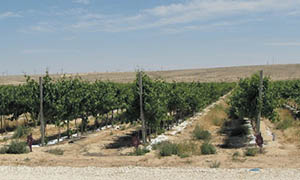
Mitzpe Ramon—Entering the new Jewish year and looking back on the last 354 days, one of the biggest hot topics in Israel has been socio-economic gaps in the Jewish state. The election in March left a brand-new party, whose platform consisted of only social-economic issues, with ten seats in Knesset, putting it ahead of existing, more ideological factions. With older studies finding gaps of thousands of shekalim in monthly expenditures between comparable families in Rechovot and Beitar Illit, and a recent report showing that the gap in earning has grown over 18 percent in the past 10 years, it seems as if this issue will only become bigger with time, and it’s clear that Israelis care about mending this gap. Some care so much that they’re actively working to help out needy families, in the spirit of the Jewish value of Tikun Olam (fixing the world). This is the story of Negev Rising.
Negev Rising began in 2007 as a group of alumni of Yeshivat Midbara K’Eden, one of Israel’s largest Hesder Yeshivot, located in Mitzpe Ramon, wanted to start a new community. They bought houses in the community and started the nearby Ramon Vineyard, and their goal from the beginning, says Director of Development Arnon Stein, was “to help Jews on the periphery.” Whether on the periphery of religiosity, on the verge of bankruptcy, or just living in the South, an area known colloquially as Israel’s perepheria (periphery), Negev Rising’s ambitious goal was to set up a community which can help.
“He made the desert like Eden” (Midbara K’Eden) [Isaiah 51:3]. Mitzpe Ramon, located in the center of the Negev, is a true Garden of Eden,” said Stein “It is a place where the Torah flourishes, education nurtures the soul and Zionism is deeply rooted. Paradoxically, it is the vast distances that lured special families bursting with the Zionist dream; families with a vision and the ability to fulfill it.
Their vineyard, initially a business venture which helped the fourteen investors put down roots in the area, is now the biggest in the Negev, covering over 350 dunam (approx. 0.14 square miles) of land and is internationally recognized. In addition to employing yeshiva alumni and Mitzpe Ramon residents, the vineyard also donates 50 percent of its profits to welfare and education in Mitzpe Ramon, showing how even this lucrative venture is about giving back to the community.
The community itself, located in Mitzpe Ramon, has a diverse atmosphere where no Jew feels like they don’t belong. This is very much seen in their elementary school, Torani Sevivati (Torah and Environment), which was the biggest primary school in Mitzpe Ramon. With over 270 students of very varying backgrounds, and no financial or religious acceptance conditions to enroll, the next generation of Negev Rising is being exposed to a diverse group of classmates from a young age, enabling them to build strong friendships and relationships with many different types of Israelis and to develop a very open-minded perspective on the world from a young age.
The community, while geographically on the periphery of Israel’s merkaz (center), is actually quite close to several major army bases in the Negev, including Machane Ramon, the main IAF base, putting it in the center of many soldiers’ day-to-day lives. Negev Rising’s community, in cooperation with its alma mater yeshiva, takes advantage of this unique opportunity by inviting soldiers to members’ homes for Shabbat, in the spirit of giving back to those defending the country. They’ve also set up several kiruv programs, under the leadership of Midbar K’Eden’s Rosh Hayeshiva Rabbi Zvi Kostner, where Yeshiva teachers and students visit the bases every week and give classes and chizuk (emotional reinforcement) to the soldiers undergoing difficult training and exercises.
“Negev Rising is privileged to contribute to the well-being and development of Jewish values among tens of thousands of IDF soldiers who train and serve in our region, the heart of the Negev,” Arnon said, “Our community is honored to be the capital city of IDF bases in the negev.
In addition to helping soldiers, Negev Rising has also set up programs to assist individuals who need other support. Ken La’Em, one of the community’s first projects, aims to help women and families with “difficult backgrounds” by pairing them with a healthy family. The latter “adopts” the kids for after-school play, and the resulting friendships that form can help treat difficulties in a much more effective and natural way than other, more clinical methods. As with other Negev Rising programs, there is no religious segregation, so Ken La’Em also gives families a unique opportunity to be exposed to Jews of other backgrounds.
These, among many others, are just a few of Negev Rising’s many projects, in their mission to engage all types of Jews on Israel’s geographical and social peripheries.
The result? A community which lets everyone involved feel like they’re making a difference in fixing Israel’s socio-economic gap.
When it comes to tackling Israel’s socio-economic problems, change won’t happen overnight. But, with the help of communities like Negev Rising, the future looks bright and things can only get better.
Arnon Stein, Negev Rising’s director of development, will be visiting the New York area beginning November 9. To learn more about Negev Rising, please contact Arnon at [email protected].
By Tzvi Silver/JLNJ Israel













